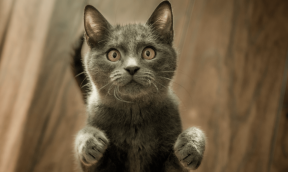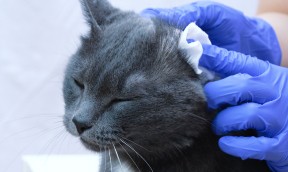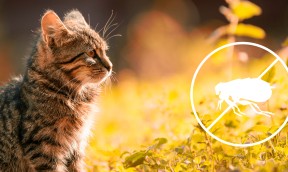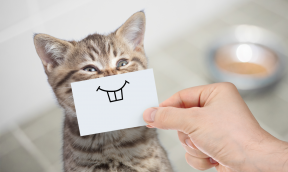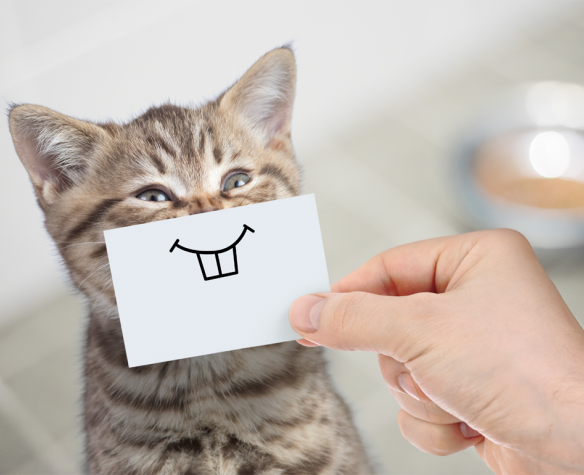
Oral hygiene for cats: essential care
Oral hygiene for cats: for a trouble-free day to day!
 Oral hygiene is part of your cat’s essential care, just like cleaning his eyes and ears. Although our feline friends are perfectly able to take care of their coats, brushing their teeth daily is important for their oral hygiene. How to clean your cat’s teeth successfully? What should I do if my cat won’t open his mouth? What solutions are available for cleaning the canine teeth? Find out all our tips for maintaining your cat’s oral hygiene.
Oral hygiene is part of your cat’s essential care, just like cleaning his eyes and ears. Although our feline friends are perfectly able to take care of their coats, brushing their teeth daily is important for their oral hygiene. How to clean your cat’s teeth successfully? What should I do if my cat won’t open his mouth? What solutions are available for cleaning the canine teeth? Find out all our tips for maintaining your cat’s oral hygiene.
How to maintain good oral hygiene for your cat?
Several solutions are available for maintaining your cat’s oral hygiene. Our feline friends are not always willing to let us open their mouths, and are even less willing to let us clean their teeth! If your pet refuses to let you take care of his oral health, you must not give up. Laboratoire Francodex offers different products to simplify oral hygiene, for even the most reluctant cat!
BRUSHING YOUR CAT’S TEETH TO MAINTAIN HIS ORAL HEALTH
Possibly dreaded most by owners rather than cats, brushing your cat’s teeth is the most effective solution for maintaining our feline friends’ oral hygiene.
The toothbrush and eucalyptus toothpaste for cats act in symbiosis for a mechanical and enzymatic action. The brush cleans your cat’s teeth, while the toothpaste acts chemically to dislodge dental plaque.
😸 From which age should I start brushing my kitten’s teeth? Even before his first tooth appears, at around three weeks! Starting as early as possible will train your cat to accept being handled. If you adopt a kitten, ask the breeder if they have carried out this training. If not, try rubbing your kitten’s gums with your finger. He will gradually learn that this gesture does not pose any danger. You will then be able to use a finger brush and, lastly, the real toothbrush for cats.
Brush your cat’s teeth in 3 steps:
- Use a toothbrush suited to the anatomy of the cat’s oral cavity. It will be made from soft bristles varying in length to reach the smallest recesses in your cat’s mouth.
- Lift your cat’s lip and start brushing after first applying a pea-sized amount of toothpaste on the brush. Brush gently to put your pet at ease without hurting him. Start from the front, as brushing the back teeth (molars) is more difficult. Your cat might show signs of being impatient.
- Opt for slightly circular and vertical movements, on the outside then inside, to remove food debris, rather than pushing it to the base of the canine teeth.
Brushing should ideally last 2 minutes. Do as best you can, with your pet’s help. Do not insist too much if he pulls his head back, as this could make him more suspicious when you try to brush his teeth next time.
SOLUTION TO BE ADDED TO YOUR CAT’S DRINKING WATER TO MAINTAIN HIS ORAL HYGIENE
To keep your cat comfortable, the best thing is to disrupt his environment as little as possible. Anything new or any changes represent a source of stress which your cat may find more or less difficult to manage.
To maintain your cat’s oral hygiene, adding a liquid formula to his drinking water is a sensible solution. Containing pomegranate extracts, the oral hygiene solution acts on bad breath and dental plaque.
If your cat refuses to drink, change his water. This oral hygiene product is formulated so as not to be detected by your pet; however, more sensitive cats might still be suspicious.
DENTAL POWDER TO SLOW TARTAR BUILD-UP IN CATS
If adding a product to your cat’s water does not yield the expected result, you can opt for dental powder for cats.
This is sprinkled on your cat’s food and will be gradually eaten with his numerous small feed rations throughout the day. Dental powder for cats helps control dental plaque and the digestive cause of bad breath.
🐾 What type of foods promote good oral hygiene for cats? To reduce the formation of dental plaque and tartar, biscuit-based foods are recommended. Chewing on the biscuits superficially cleans cats’ teeth. In contrast, wet food requires no chewing effort and residue sticks more readily to the tooth wall. Cats who go out into the garden and hunt will benefit from the abrasive effect of their prey’s fur. This is good for cleaning the teeth, but not great for the breath and digestion!
MAINTAINING ORAL HYGIENE FOR CATS WITH “FRESH BREATH” TREATS
Your cat will enjoy having a little treat every day. He will find this comforting and see this as a sign of your affection. “Fresh breath” treats are a practical and pleasant way to support your cat’s good oral hygiene.
If you are planning to take your cat on holiday, this format is travel-friendly and can calm your pet if he is averse to changes in his routine.
IMPROVE YOUR CAT’S ORAL HYGIENE WITH A BREATH FRESHENER SPRAY
Perhaps more perilous to administer, despite being noiseless when sprayed, the breath freshener spray is applied directly on the gums and teeth. It prevents the formation of dental plaque while strengthening the gums.
Why should you be concerned with your cat’s oral hygiene?
Dental plaque and tartar can lead to the development of periodontal disease in cats. To see if your cat is suffering from this, watch him while he is eating: does he have any difficulty chewing or swallowing?
If the bacterial infection is advanced, this can lead to the formation of painful abscesses. Your cat will ultimately lose his teeth and refuse to eat.
🐈 Did you know? Some breeds selected to modify facial morphology are prone to build-up of tartar. Does your cat fall into this category? Stay vigilant and take even more care to maintain good oral hygiene for your cat.
What are the specific oral and digestive characteristics of cats?
Cats’ oral anatomy and physiology are characteristic of carnivores. Their pointed teeth are more effective at cutting than grinding food, obliging them to swallow food before it is finely cut up which aids digestion. Chewing is strictly minimised in order to swallow morsels sufficiently small to pass through the first part of the digestive tract.
Furthermore, cats’ saliva contains no amylase, an enzyme which helps digest starch, which leads to almost intact balls of food reaching the stomach.
What dental problems are observed in cats?
Cats’ physiological and physical characteristics make them more resistant to tooth caries, but more vulnerable to the development of dental plaque and tartar.
Dental plaque is a bacterial film which gradually covers the teeth and in the long term leads to the formation of tartar.
If your feline friend has bad breath (feline halitosis) or if you notice that his gums seem irritated (gingivitis), you should consider the possible development of dental plaque and tartar.
If your cat lets you look in his mouth for long enough, you might see orange-yellow zones on the less smooth teeth, signs of extensive tartar build-up.
🙀 Warning! Bad breath or oral lesions in cats are not always related to the development of dental plaque and tartar. Your pet might have been injured when playing or during one of his adventures outside. He could also suffer from digestive issues. Do not rule out any possibilities if you notice that your cat has oral problems, and visit a veterinary surgeon without delay.
When do I need to have my cat’s canine teeth descaled?
If you see that your cat’s gums are swollen or bleed often when eating, a visit to your veterinary surgeon is essential to identify the cause of the problem.
Although descaling is a painless ultrasound procedure, your cat will need to have a general anaesthetic. The veterinary surgeon will then be able to carry out the procedure properly while keeping your pet’s mouth open. At the end of the descaling procedure, a polishing paste is applied to the canine teeth. Your cat will come home with teeth that look almost brand new! However, the visit to the veterinary clinic and anaesthesia are a source of stress for your cat.
If a tooth has become damaged due to excess tartar, your veterinary surgeon will carry out an extraction. Your pet will feel relief and will be able to eat again with pleasure and without pain. Missing a few teeth will have no impact on your cat’s feeding habits.
To avoid having to put your cat through descaling or tooth extraction, take care of his oral hygiene daily or at least twice a week!
Article drawn up with the assistance of
Dr Stéphanie PADIOLLEAU, Veterinary Surgeon



